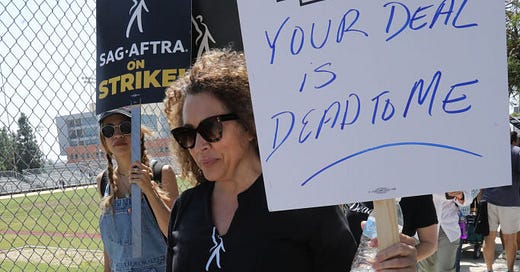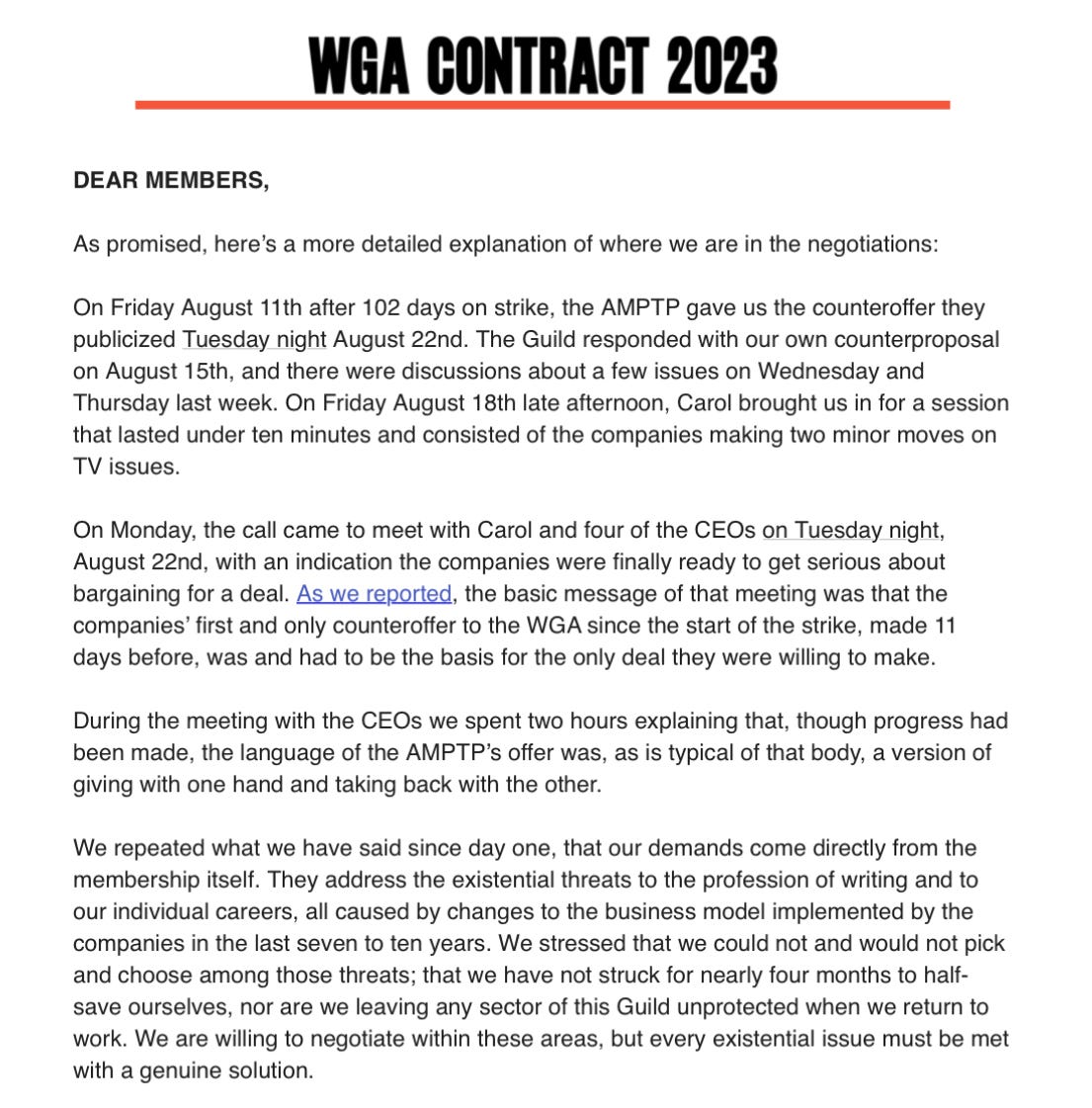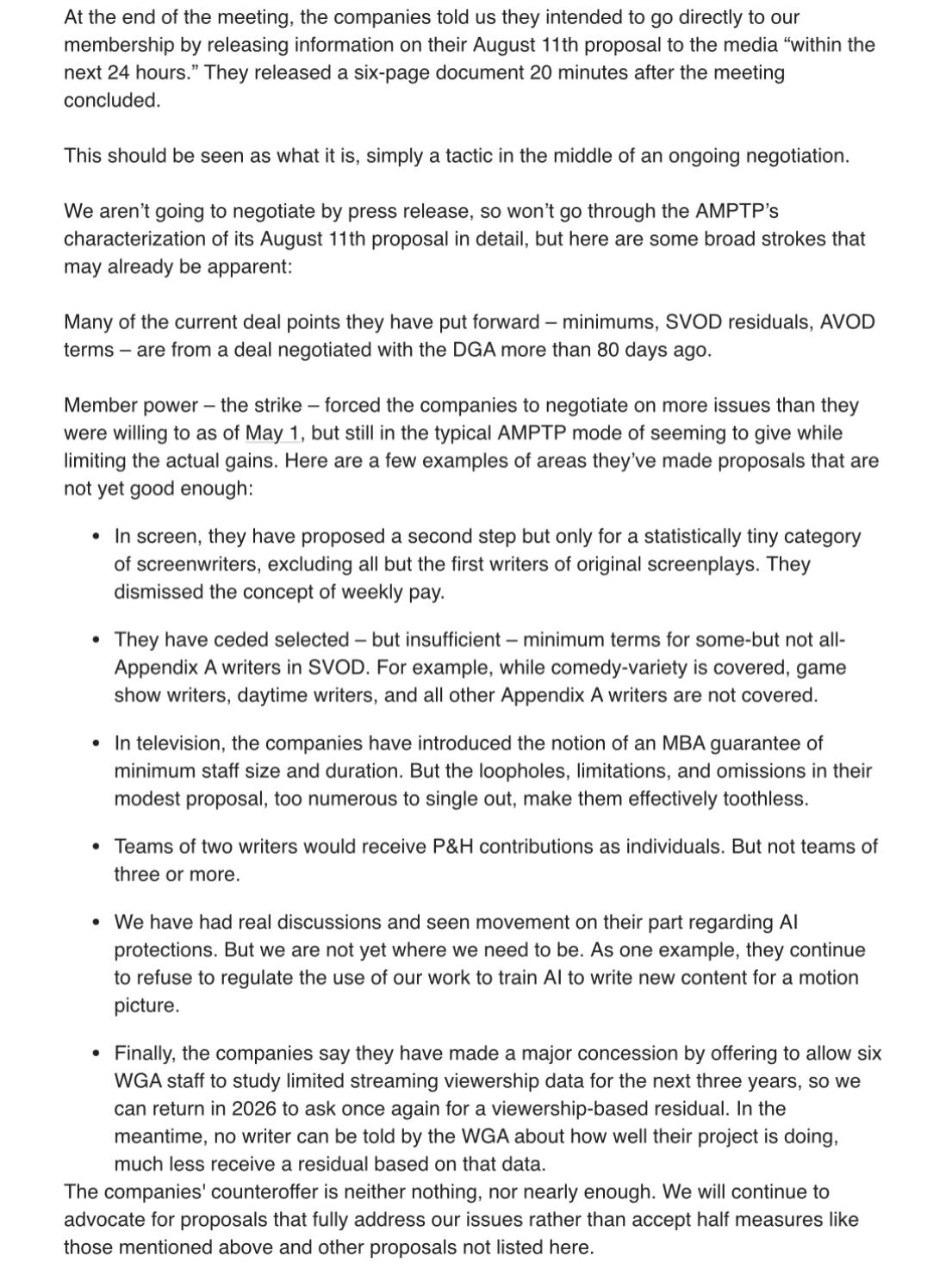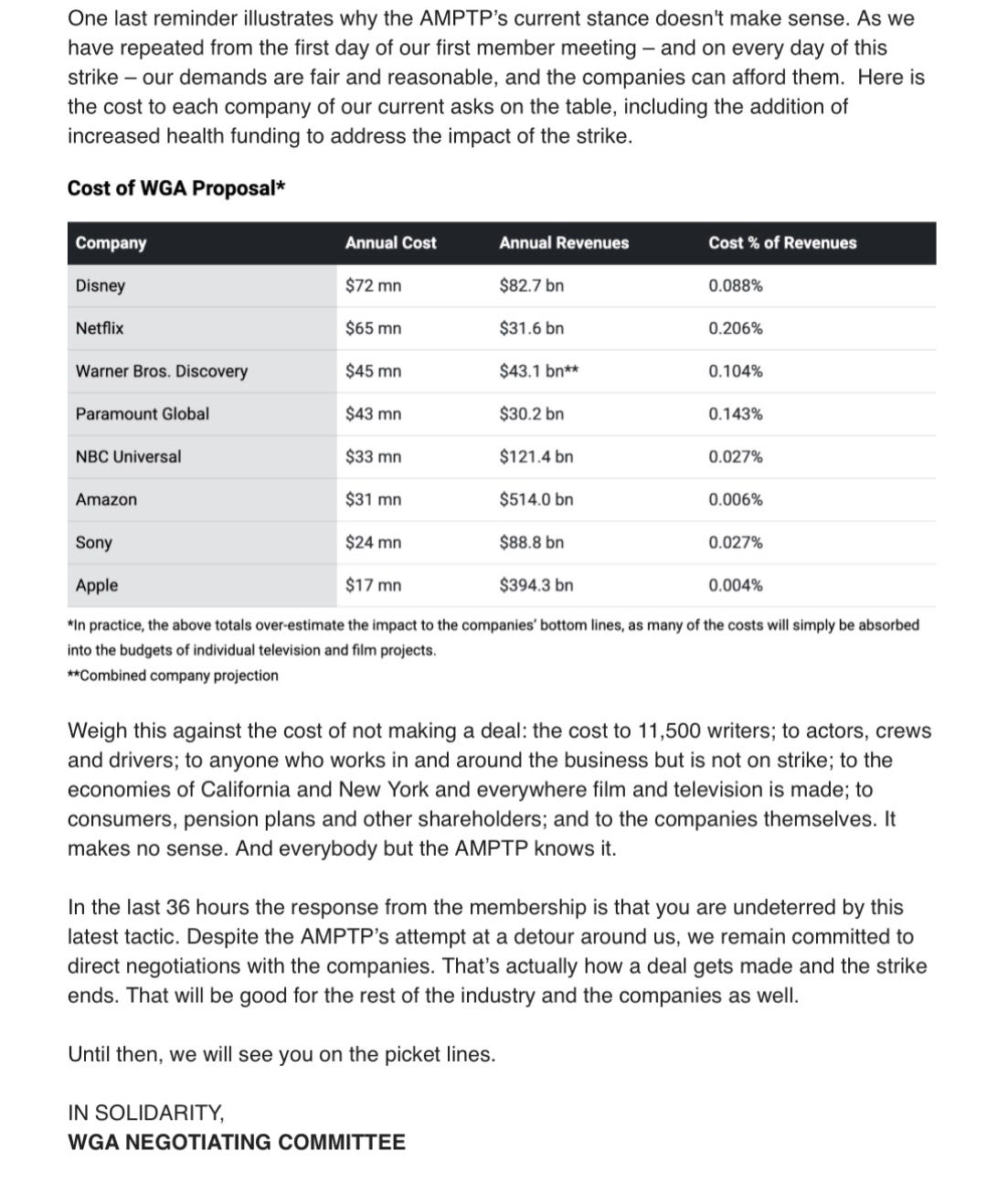'Neither Nothing, Nor Nearly Enough': WGA Responds to Studios' Offer
➕ 'So bad, so depressed, so scared': the human toll of summer's strike

We are now 115 days into the writers strike, and we have something resembling progress, and maybe something portending further doom.
The Writers Guild of America wrote a lengthy letter to its 11,500 or so members this afternoon, offering a blow-by-blow of the negotiations — something it said it wanted to avoid doing! — after the Alliance of Motion Picture and Television Producers released the details of its proposal package Tuesday night, a move that backfired in spectacular fashion.
You can read the full text below, but the gist is that the AMPTP’s counter to the union’s demands were “not nothing, nor nearly enough,” which the WGA called a version of “giving with one hand and taking back with the other.” The guild plans keep plugging away for a counter that fully addresses its concerns, “rather than accept half measures like those mentioned above and other proposals not listed here.”
To recap, the studios had offered — among other things — “significantly” higher wages, bumps in high-budget SVOD residuals, a “new structure” to train future generations of showrunners that mandated at least two mid-level writers per production, guaranteed minimum of 10 weeks of employment for writers in development rooms, some broad language about A.I. protections, and quarterly reports of viewership data that will include the “total aggregate number of minutes a High Budget SVOD Program is viewed and the program’s total running time.”
To which the WGA essentially said, Well told. Good start. But we haven’t gone on strike for nearly four months for this. According to the guild:
Here are a few examples of areas they’ve made proposals that are not yet good enough:
In screen, they have proposed a second step but only for a statistically tiny category of screenwriters, excluding all but the first writers of original screenplays. They dismissed the concept of weekly pay.
They have ceded selected – but insufficient – minimum terms for some-but not all-Appendix A writers in SVOD. For example, while comedy-variety is covered, game show writers, daytime writers, and all other Appendix A writers are not covered.
In television, the companies have introduced the notion of an MBA guarantee of minimum staff size and duration. But the loopholes, limitations, and omissions in their modest proposal, too numerous to single out, make them effectively toothless.
Teams of two writers would receive P&H contributions as individuals. But not teams of three or more.
We have had real discussions and seen movement on their part regarding AI protections. But we are not yet where we need to be. As one example, they continue to refuse to regulate the use of our work to train AI to write new content for a motion picture.
Finally, the companies say they have made a major concession by offering to allow six WGA staff to study limited streaming viewership data for the next three years, so we can return in 2026 to ask once again for a viewership-based residual. In the meantime, no writer can be told by the WGA about how well their project is doing, much less receive a residual based on that data.
Despite all the communiqués and whispers that have ultimately made their way to the press, and the outcry on social media about various tactics, this arguably constitutes progress. The downside is that despite the week starting off on a hopeful note, with some surmising that a deal could be made by Labor Day, the odds of that appear to be increasingly slim.
Scroll all the way down to the bottom of this newsletter to read the WGA’s full letter to membership.
'So Bad, So Depressed, So Scared': the Human Toll of Summer's Strike
As my colleague Peter Kiefer (with a minor assist from me) broke down in this feature on The Ankler today, times are tough as the strikes grind on.
“It’s like a mutual fucking and both sides just seem to suck right now and the only loser is everyone,” says a top manager at a firm that recently asked its principals to take salary cuts to avoid laying off any assistants or staffers.
[…]
The idea that the strike appears to be stretching into the fall is no small matter, both psychically and logistically. Over the past eight years, thanks to streaming’s non-stop churn, the film and television industry has become less seasonal but the coming months traditionally have remained one of the busiest periods of production in L.A. Films that shoot in the fall typically are required to wrap by mid-December to avoid the surcharge on productions that occurs when shooting over the holiday. According to several executives, the further the strike extends into fall, the more likely that certain projects won’t get an official greenlight till the New Year — 2024 — even if a deal is struck weeks earlier.
And with festival season and Oscar season about to kick off, the predictable get-your-engines-started high-wattage start of awards season (not to mention fall TV) is zero-to-sluggish, at best. Worse, just a few days ago, the mood within the industry was hopeful. The silence surrounding negotiations suggested that progress was being made and that a tentative deal could be announced at any moment. But after the AMPTP released details of its Aug., 11 offer, recriminations recommenced, likely setting back a deal by at least several weeks.
“Everyone is anxious and concerned, even actors who aren’t financially hurt by this. They’re affected by it mentally,” says a veteran industry publicist. “Nobody knows how this is going to end but more importantly no one knows when it’s going to end.”
Read the full story on main, with a paid subscription. Can’t afford The Ankler right now? If you’re an assistant, student, or getting your foot in the door, and want help navigating the craziness of this business but don’t have the money to spare, email The Ankler himself at richard@theankler.com and we’ll work it out. No mogul or mogul-to-be left behind here at The Ankler.
Today in Strike News
SAG-AFTRA president Fran Drescher contends that the double strike is not just about actors and writers, but rather about an entire culture of shareholder-focused businesses neglecting their workforces. “I think that it’s taken on a bigger scope, it’s greater than the sum of its parts,” she said. “I think it’s a conversation now about the culture of big business, and how it treats everybody up and down the ladder in the name of profit.” (AP News)
Dune: Part Two is being pushed from November to March of next year amid the ongoing strikes, during which stars such as Zendaya and Timothée Chalamet are not appearing on red carpets or participating in publicity tours. (Deadline)
One of SAG-AFTRA’s three proposals to the AMPTP that involves stunt coordinators was the group’s inclusion in residuals on network reruns, foreign television and streaming shows, something stunt orchestrators have been clamoring for. “Stunt coordinators for theater releases are guaranteed residuals the same as the performers, yet when you move over to TV streaming, we get none,” says Cort L. Hessler III, national chair of the SAG-AFTRA Stunt and Safety Committee. “In theatrical land, there are pooled residuals. In TV land, it’s fixed residuals for performers, so they have a ceiling on what they can make. We just want the performer residuals.” (The Hollywood Reporter)
Indie film producers say they can’t lock in casts due to the time it takes to obtain an interim casting agreement, and hope that SAG-AFTRA can begin to fast-track the grants. (Deadline)
Though A.I. has arguably been one of the most worried-over negotiating point for the unions, some VFX workers are optimistic about the technology’s ability to improve what gets put on the screen. “A.I. is not about taking jobs from people, it’s about making things faster and more efficient,” Chaos Group Labs director Chris Nichols said. (The Hollywood Reporter)
The cast and crew of Glee reunited on the picket line Wednesday with signs that referenced the hit Fox series, honoring deceased star Naya Rivera in the process. (Popsugar)
Picket Sign of the Day
I can hear the the tune in my head already.

Here’s the WGA’s full letter to members, sent Thursday afternoon:
Additional reporting in Today in Strike News by Matthew Frank.
Disclosure: Elaine Low is an inactive member of SAG-AFTRA.







